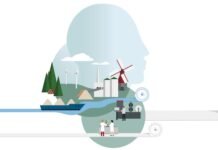
The minister of the environment, climate protection, and energy of the German state of Baden-Württemberg, Thekla Walker, visited the Koehler Group’s headquarters in Oberkirch in order to learn more about the company’s environmental and climate strategy.
The family business, which employs around 2,500 people worldwide, has been investing in renewable energy for over 10 years. Its existing coal-fired power plant in Oberkirch is currently being converted in order to use environmentally friendly biomass, with the work slated for completion by the fall of 2024. This change is expected to reduce future CO2 emissions at the site by 150,000 metric tons a year.
Part of the company’s environmental and climate strategy
Decarbonizing energy and steam generation is part of the Koehler Group’s climate strategy. In the long term, both Germany and the EU are striving to become climate neutral. The EU is aiming to reach this milestone by 2050, while Germany is targeting 2045. The Koehler Group has set even more ambitious targets for itself and is aiming to generate more energy from renewable sources than is required for paper production by 2030.
In order to take biomass and use it to produce the energy required to make a variety of special paper products in Oberkirch going forward, the Koehler Group has invested over 70 million euros. The existing power plant, which was built in 1986, is being adapted for the new fuel through various conversion measures. In addition, two collection points for unloading trucks and corresponding silos will be built.
In future, Koehler will use wood chips, green waste, and mill residue as fuel. The advantage of using biomass as a fuel is not only the fact that it is carbon neutral, but also that it is widely available. In fact, only natural wood that comes from the surrounding region and that is at the end of its usability as a material will be used. Moreover, the short distances involved in the corresponding logistics mean that the Koehler Group will be reducing its carbon footprint even more.
Minister impressed
During a tour of the power plant construction site, Hartmut Felsch, the mill director at the Koehler Paper site in Oberkirch, provided an update on the current construction progress. Minister Walker appeared impressed: “The Koehler Group is a great example of how sustainability and profitability can go hand in hand. They’re well on their way to leaving fossil fuels behind and adopting renewable energies instead, all while securing their own future as a result. In other words, the Koehler Group is showing how energy intensive companies in the business hub of Baden-Württemberg can tackle this transition successfully as well.” In short, sustainability pays off in the long term.
Stefan Karrer, chief operating officer (COO) of the Koehler Group, had the following to add: “Sustainability is not a fad for us, but a necessity instead. It’s the way that we can preserve and develop positive environmental, social, and economic conditions not just for us, but for future generations in particular as well. By decarbonizing our power plant in Oberkirch, we’re not just taking a big step towards becoming climate neutral as a company, but also towards helping Germany achieve climate neutrality as a country.”
Converting the power plant to biomass will reduce emissions by over 150,000metric tons of CO2 per year at the Oberkirch site and is another step towards achieving the goals set out in the Koehler Group’s environmental and climate strategy.
Lignite Power Plant converted
Earlier, the Koehler Group had successfully converted its power plant at the Koehler Paper site in Greiz from lignite fuel to using fine wood fraction. The experts from Koehler Renewable Energy, which is part of the Koehler Group, have succeeded in developing a technique that makes it possible for a type of biomass to be used as fuel in the existing coal-fired power plant in a completely new way. This is a first in the market and opens up countless new opportunities for the decarbonization of combined heat and power plants. Wolfgang Tiefensee, Thuringia’s Minister for the Economy, Science, and Digital Society, visited the site for the inaugural test run of the converted power plant.
Decarbonization is part of the Koehler Group’s climate strategy
The conversion of the power plant at the Greiz site is part of the Koehler Group’s climate strategy and an investment in the future. Koehler has set itself the goal of producing more energy with its own renewable energy facilities from renewable sources than is required for its paper production operations by 2030. To achieve this aim, the company continues to invest in biomass combined heat and power plants, wind farms, hydroelectric power and solar energy.
Stefan Karrer had stated: “Replacing fossil fuels brings Koehler even closer to our objective of Group-wide decarbonization. The plan is to reduce the Koehler Group’s scope 1 direct greenhouse gas emissions by 80 percent by 2030 in comparison to the levels from 2022. The Koehler Paper site in Greiz has already made a start towards this with its pilot system.“
The conversion process for the Koehler power plant in Greiz has been given extensive support from the experts at Koehler Renewable Energy. The structural implementation was carried out by a project team from Koehler Innovation & Technology in cooperation with local experts on site at the Koehler Paper site in Greiz. Udo Hollbach, managing director of the Koehler Paper site in Greiz, is delighted about the conversion: “Switching from lignite to fine wood fraction will allow us to save more than 24,000 metric tons of CO2 emissions per year at the Greiz plant.” The Koehler Group has invested around EUR 8 million for the entire plant conversion project.










